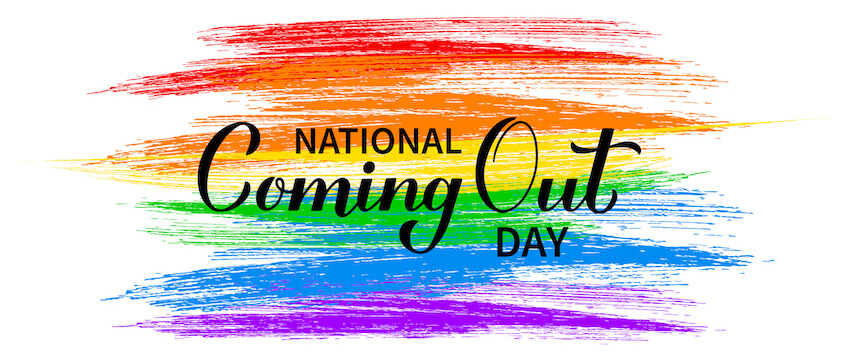Informative ‘lunch-n-learn’ resonates with employees on National Coming Out Day

"In the old days, it was assumed that one's gender was determined by your environment – how you were raised and what your parents told you – and as a passive response to your anatomy," explains Katherine Rose, MD, plastic and reconstructive surgeon and director of Main Line Health's Gender Care Program. "We now know that your gender identity cannot be taught – it is biologic and is not a choice."

Dr. Rose, along with Main Line Health colleagues Dane Menkin, CRNP, of Bryn Mawr Family Practice and director of LGBTQ Services at Main Line Health; Caitlin Lawrence, a psychotherapist at Women's Emotional Wellness Center, part of Main Line Health; and a nurse navigator for Main Line Health's Gender Care Program, met on a virtual call with more than 140 Main Line Health employees who had registered for the LGBTQIA+ Lunch-n-Learn on Monday, October 11th—National Coming Out Day.
While all employees at Main Line Health are required to complete computer-based training about how to respectfully communicate and provide welcoming and affirming services to LGBTQ patients, additional education opportunities such as the lunch-n-learn are voluntary.
Why pride? The importance of LGBTQ education
The hour-long session kicked off with the question: "Why pride?
Menkin explained that the term pride is used as the predominant outlook associated with LGBTQ rights movements—as opposed to shame or social stigma—and in the context of the lunch-n-learn, as a way to view what Main Line Health is doing for LGBTQ visibility and education.

Menkin pointed to numerous achievements and ongoing efforts at Main Line Health to provide a welcoming environment for LGBTQ patients, including:
Ambulatory practices
- Creation of and continued education of hundreds of physicians and advanced practice providers in primary and specialty care
- Creation of a workgroup which focuses on the intersection of the electronic medical system and LGBTQ patient care
- Development of Gender Care Program
Inpatient environments
- Transgender bed assignment policy - guides inpatient staff to correctly assign a semi-private bed when the patient is transgender. It focuses on providing the transgender patient with the option of a room congruent with their sex assigned at birth or one congruent with their affirmed gender; in a setting where a private room is not available.
- Infant nursing policy – updated to reflect more inclusive language such as "chestfeeding" vs. breastfeeding and "birth parent" instead of "mother."
- Human Rights Campaign (HRC) Healthcare Equality Index rating of 95% for Lankenau Medical Center, Bryn Mawr Hospital, Paoli Hospital, Riddle Hospital, Bryn Mawr Rehab, and Mirmont Treatment Center
- Staff education in caring for transgender patients
Workforce education
- Systemwide education forums/lunch-and-learns/Grand Rounds
- Systemwide surveys designed to assess the needs of the Main Line Health workforce in their areas of care provision
- Implementation of five-hour resident curriculum focused on specific LGBTQ clinical care, including PrEP, PEP, and STD/HIV prevention, treatment and management, and gender-affirming care, including training of surgical residents in gender-affirming surgery.
- Collaborative programs with Women's Emotional Wellness Center, Mirmont Treatment Center, and the speech therapy program
- Education of scheduling, social work, and technology personnel
- Creation of a Main Line Health LGBTQ Pride Committee
Menkin also pointed to numerous community awareness efforts that are now in place, including Main Line Health's participation in the annual Philadelphia Trans-Wellness Conference, and education of regional college student health services specific to LGBTQ students at Bryn Mawr College, Haverford College and Devereux. Main Line Health has also successfully developed community support groups and liaisons with KYW, 6abc and Well Ahead Philly.
LGBTQ terminology: What to say and how to say it
Caitlin Lawrence of Women's Emotional Wellness Center led a conversation about "the alphabet soup" of LGBTQIA (Lesbian-Gay-Bisexual-Transgender-Queer, or questioning-Intersex-Asexual, or allies), using the gender-neutral "gingerbread person" to illustrate the differences between sexual attraction, gender identity and gender expression. Cis gendered refers to anyone whose sense of self does align with their genitals and the sex they were assigned at birth.

Lawrence pointed out that people who are transgender, for example, may have been assigned a sex at birth but that is not really who they are. The person's gender identity is who they really are, to themselves.
Pointing to the heart, Lawrence explained, "Attraction refers to who you're attracted to sexually, physically and spiritually. It's who you go to bed with. She went on to explain asexual attraction, or being intimately attracted and connected to others, without being sexually attracted.
The belly of the ginger person refers to gender expression. This can be how a person behaves or dresses, for example. "Men in dresses, women in pants," said Lawrence. "Clothing and jewelry have no gender. There's fluidity with that."
And finally, the ginger person's genitals refer specifically to anatomical sex and chromosomes, often an identifiable binary gender, but keep in mind, added Lawrence, "The 'I' in LGBTQIA stands for 'intersex.' Many that are neither male or female may have female characteristics or male, but their chemistry or hormones and everything else identifies them as male. It's much more complex than binary gender."
Gender identity does not equate to gender expression or sexual orientation.
Dr. Rose further elaborated on the term transgender, which she uses to encompass the experience of many, as defined by: "anyone whose internal sense of self does not line up with their genitalia."
As a plastic and reconstructive surgeon specializing in gender-affirming surgery, Dr. Rose spoke about gender dysphoria, which is the psychological distress caused when one's gender identity does not align with their sex assigned at birth.
Rose recognizes a massively underserved patient community disproportionately affected by mental health issues and wariness of doctor's offices based on past experiences in which they felt uncomfortable or were not treated respectfully.
The new Main Line HealthGender Care Program was designed to fill a wide range of needs for the transgender and gender-expansive community. We have expert providers in all areas of gender-affirming care, including age-appropriate primary care, speech therapy, fertility preservation, gender affirming surgery, mental health, and social services.
"We offer a streamlined, multidisciplinary approach to gender-affirming care. Our goal is to make gender-affirming care accessible and affordable," said Rose.
Getting competent health care as a transgender person
For transgender people, finding competent health care providers can be challenging and disappointing. On the other hand, transgender patients who arrive at Main Line Health often report a positive experience and appreciate receiving inclusive care from a health system that is actively addressing the needs of transgender and nonconforming people. In health care, there is not only such need but a responsibility on the part of health care practitioners—to expand the freedoms of respectful, inclusive, quality health care to all.

How to be an LGBTQ ally
Questions from Main Line Health employees included, "How do I be an ally to the LGBTQ community?"
Specific to health care providers, Lawrence advised participants to consider what the experience is like when a patient walks into their office. What is patient registration like? How is the greeting from doctors or nurses or therapists?
"How are we signaling our ally-ship?" she posed. "Let people know when you do slip up, you can say, 'Sorry, I'm learning.' And the best apology is always a changed behavior."
Dr. Rose added that being an ally means standing for the LGBTQ community even when no one else is around and there's no one to defend. "It is our responsibility to speak up and educate others."
Stay open and be willing to learn from a person of trans experience.
Be open-minded. If there's one thing the world could use more of, it's open-mindedness, the group agreed, just a willingness to try to be inclusive.
"Even if you don't get it or understand it or whether it emotionally feels right or comfortable to you, you can still be open to it," said Dr. Rose.
Make rainbow connections. Small things make a difference, too, especially in health care. Wearing a rainbow lanyard or a rainbow sticker on your badge or on an office door tells people you're open to the conversation. At Main Line Health King of Prussia, everyone in the offices there were wearing rainbow masks on Monday in honor of Coming Out Day.
"It signals that this is a comfortable conversation for me and I'm prepared for it," explained Lawrence.
Some nurses and other practitioners have a signature on their badges (that reads: "I'll go with you." – implying they will go to the bathroom with a patient, to ensure safety.
Pronoun badge pulleys are another way health care providers throughout our health care system can show inclusivity. Pronoun pulleys are available to all employees and can be picked up in the HR department as well as at badging offices at each hospital.
Speak up, speak out, speak for. Being willing to correct someone who has mis stepped in front of you is another way to stand with the LGBTQ community. You can politely correct a colleague in private or you can fix things in the moment by using the correct name or pronoun preferred by the patient, or by providing the patient with whatever support is needed.
Respect people, and respect people's pronouns. No matter how people present themselves—since they may not always "look" like the pronoun they identify with—take people for who they say they are.
"If you continue to show up in support of whatever it is," says Menkin, "that produces a massive shift over time—in your corner of the world."